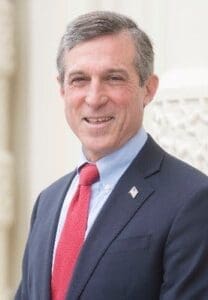

Gov. John Carney will end his COVID-19 public health order on May 11, following in the feds’ footsteps.
Playing follow the leader, Gov. John Carney announced Tuesday he will end the State of Delaware’s COVID-19 Public Health Emergency Order on May 11.


Gov. John Carney
That will coincide with the plans of President Joe Biden, who announced months ago that he would end the national public health emergency May 11.
“Consistent with the ending of the federal public health emergency, and with Delaware’s continued progress in moving beyond COVID-19, we’ll plan to end our public health order this May,” Carney said in a press release. “We will keep working with businesses and the health care industry as we finalize this transition. Thank you to each and every Delawarean who helped us get to where we are today.”
Under Delaware law, Public Health Emergency orders must be renewed every 30 days.
Carney extended his public health emergency order on March 31, 2023 and will plan to formally extend the state’s order once more in April.
Emergency order protests
The order enraged many who were opposed to some of the things imposed under it: business shutdowns; virtual classes; mask mandates for business and schools; and mandatory COVID-19 vaccinations for some jobs.
“It’s about time,” said Senate Minority Whip Brian Pettyjohn, R-Georgetown.
House Minority Leader Mike Ramone, D-Pike Creek, said many people wanted the state of emergency lifted months go. But if Carney had lifted it early, many Delawareans who receive Medicaid would not have been eligible for the extended Medicaid benefits.
“Because of that particular issue, the Public Health State of Emergency was extended to May to give those whom now will be removed from the eligibility roles time to make adjustments in their lives to prepare for the modifications,” he said.
“It’s time to move past this extended initiative,” he said.
One reason that Carney kept the order, he and others have said, is because it needed to be in place in order for the state and state programs to get federal money.
As the federal government is stepping back, it also means that emergency food stamps were stopped in March and that Delaware will be begin looking at those enrolled in the Medicaid program in a process they describe as “unwinding.”
When the COVID-19 pandemic began, people were allowed to join Medicaid without having to jump through hoops like having their income verified. Now they will have to.
But there’s a catch for the state: Federal money will dry up faster than federal rules will allow the state to remove people from Medicaid rolls. In the meantime, the state will have to foot some of the costs that had been paid by Medicaid.


Betsy Price is a Wilmington freelance writer who has 40 years of experience.
Share this Post








